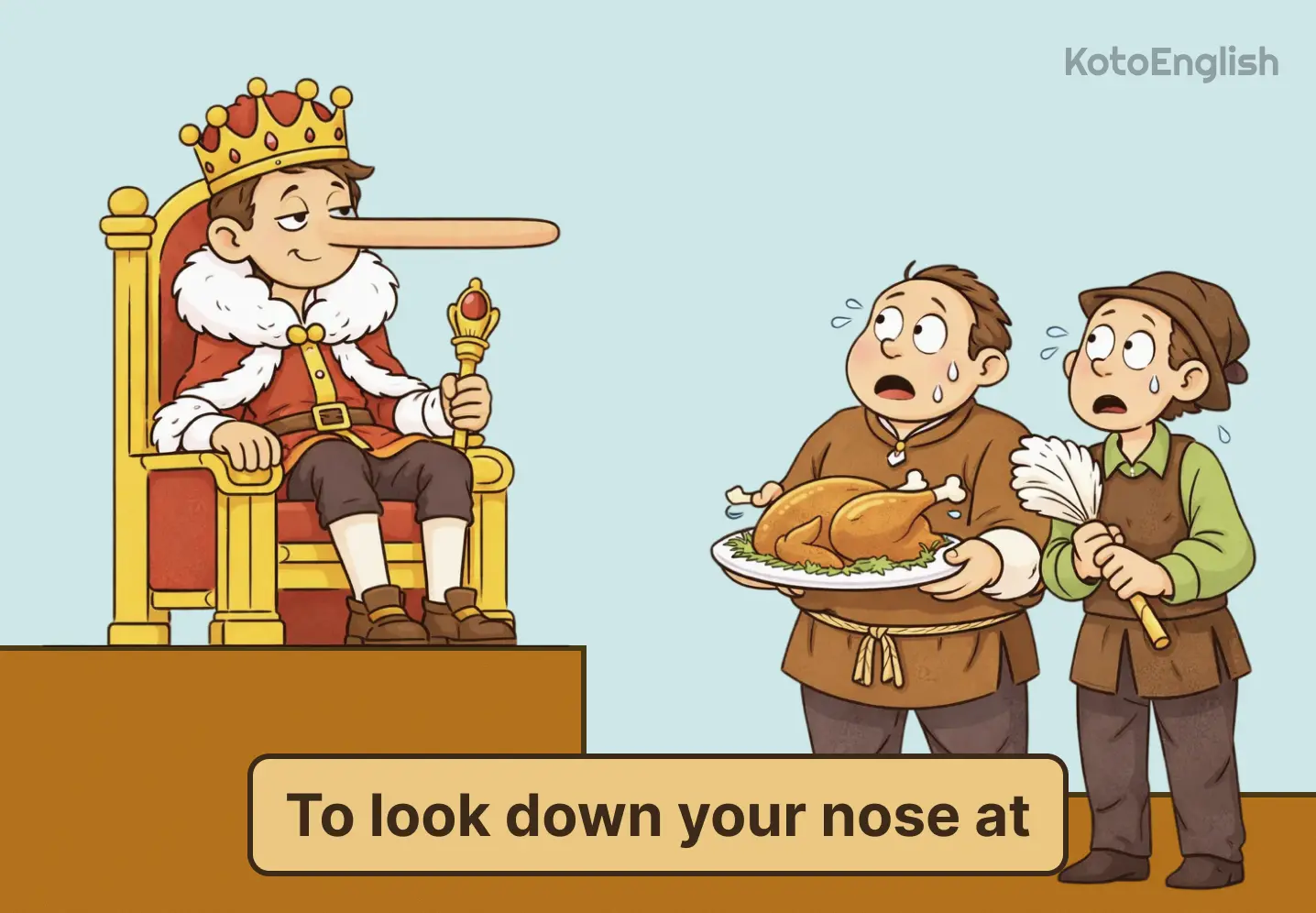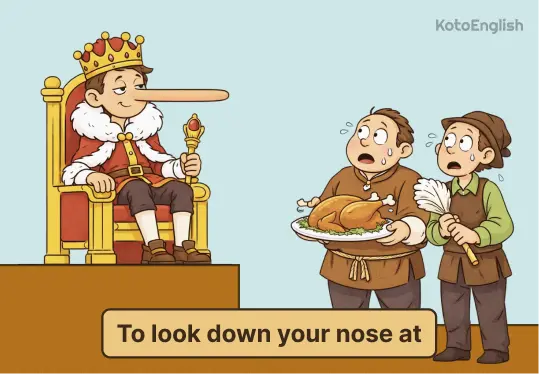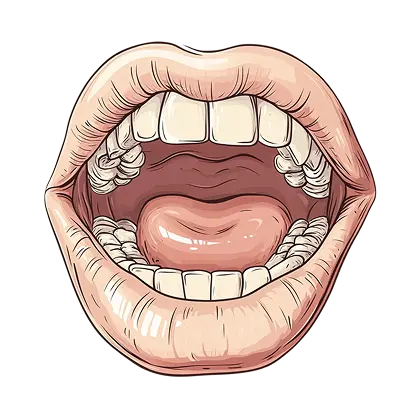

Nose (noun) — is the part of the face that protrudes above the mouth, typically containing two openings called nostrils. It serves as the primary organ for smelling and is also a part of the respiratory system, allowing air to enter and exit the lungs.
How to Pronounce “Nose”?
Start with the n sound by placing your tongue behind your upper teeth, followed by a long o like in “bowl” by rounding your lips, and end with the z.
Level up your English with Koto!
How to Use “Nose” in a Sentence?
Take a look at how you can operate this word within the sentences to share certain information in oral or written form with your family, friends and colleagues.
What Are Synonyms for the Word “Nose”?
You have just covered information about the “nose” in sentences, and we hope that you remembered everything correctly. Let us move on and define a “nose” through its synonymous expressions!
Related nouns: nostril nasal cavity sniffer
Synonyms (contextual): none, it’s a specific noun
Common collocations: stuffy nose nose bleed runny nose
“Nose” Word Formation and Description in Context
Apart from the sentences, you can use the word “nose” in combination with other parts of speech in English to create new, meaningful language units in the form of collocations.
With adjectives: long nose sharp nose red nose cold nose
With verbs: blow nose wipe nose smell with nose scratch nose
With nouns (noun + noun): nose tip nose piercing nose job nose guard
Idioms and Phrases with “Nose”
This word often appears in phrases with meanings that aren’t immediately obvious. Explore their explanations and examples to use them in everyday life.
-
To poke/stick your nose into — To interfere in someone else’s business, life, etc.
Don’tpoke your nose into my personal life. -
Under your nose — Something is nearby or happening very close to you, often unnoticed.
The keys were rightunder your nose the whole time! -
To look down your nose at — To act as if you are superior to someone or something.
Shelooks down her nose at anyone who doesn’t share her taste in art.


-
To put your nose to the grindstone — Really work hard and focus on a task.
If youput your nose to the grindstone , you’ll finish the project on time. -
To have a nose for (something) — Unique natural ability to notice or find something.
Hehas a nose for good deals and never misses a bargain.
Test Your Knowledge of “Nose” Meaning
You already know about the “nose” definition, so what about checking your knowledge in our intellectual game? Apply everything you understand and learn even more as a result!
Enjoy personalized learning!
“Nose” Word in Other Languages
Training how to spell “nose” and properly pronounce it will show you some similarities between different language groups, thus boosting your general knowledge and perception.
| Language | Word for “Nose” |
|---|---|
 Spanish
Spanish |
Nez |
 French
French |
Nariz |
 German
German |
Nase |
Impressive Facts About “Nose”
Today, we have covered a lot of different information about the word “nose,” but still, we have something left that will definitely surprise you. Check out these unbelievable facts about this part of our bodies!
-
Human noses can detect over a trillion scents
Our olfactory system functions almost like a highly sophisticated chemical detector, yet we tend to overlook its capabilities. The notion of a human nose perceiving about 10,000 distinct odors is outdated — we have the incredible ability to recognize more than a trillion scents. -
Some people have noses that are “super smellers”
For people with hyperosmia, routine scents such as perfume or even cooking spices can be extremely overwhelming — a case of just too much of a good thing. Books and articles published on the subject of hyperosmia reveal that such a condition enables people to detect scents many times more than the average person. -
Your sense of smell affects taste
Odors sniffed by the nasal cavity determine close to 80% of taste. This explains the bizarre phenomenon of food losing its flavor during a cold — people wonder why it happens when the truth is that the nose is blocked. -
Sneezes can travel faster than 160 kilometers per hour
When your nose gets rid of something that bothers it, air and tiny droplets zoom out. There’s a huge expulsion of particles in the order of thousands. One small sneeze can put countless particles into the air. Spreading germs can be avoided if you cover your nose properly. -
Nose shape is linked to climate
From anthropological studies, it has been observed that nose shapes undergo evolution based on the area we live in. People in hot and moist places have wider noses, which aid in body cooling and facilitate easier airflow. On the other hand, people residing in chilly and arid places have thinner noses, which are more efficient at warming and moisturizing the air.
Famous Quotes Featuring “Nose”
These quotations show how writers and thinkers have used the image of the “nose” word to illustrate deeper truths about life, society, and personal growth.
— Mason Cooley
Explanation: This quote warns how pride affects someone’s awareness. People who are overly proud and look down on others are likely to lose sight of their path. Pride is also expected to cloud a person’s judgment and lead them into a situation where humility could have helped them take a step forward.
Explanation: The author views his childhood as a period where books served as his companions. This image captures a reserved or introverted child who sought escapism and companionship in narratives rather than social interactions.
— Stephen King
Explanation: He reveals how the connected aspects of small-town life make people notice and keep track of what others are doing. In such close-knit communities, “gossip travels fast.” People metaphorically have a heightened “sense of smell,” and even the smallest changes cannot be unnoticed in the strictest sense.
— Voltaire
Explanation: Voltaire delineates the distinction between innate qualities and those embraced through nurture. In contrast to physical features, which are given, religious insights are cultivated through our surroundings, education, and journey. It signals that profound understanding requires effort and is not effortless.
— Paul Claudel
Explanation: This French poet satirically attacks the shortsightedness of diplomats. The image of the “long nose” implies a shallow, immediate focus. It hints at their inability to deal with more meaningful or long-term issues and at their tendency to overlook the bigger picture.





